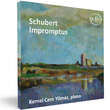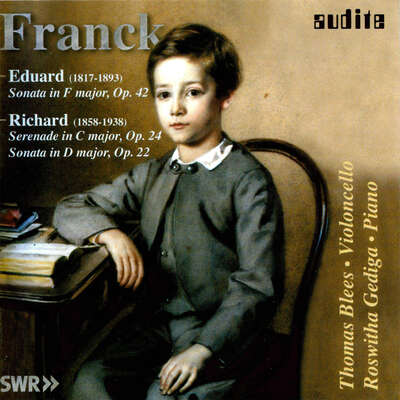
Schuberts acht „Augenblickliche Einfälle" aus dem Jahr 1827 sind Charakterstücke, die zu den bekanntesten und populärsten Werken für Klavier zählen. Voll von lyrischem Reichtum sind sie weit mehr als Bagatellen oder Launen, wie es der Titel nahelegt.mehr
Schuberts acht „Augenblickliche Einfälle" aus dem Jahr 1827 sind Charakterstücke, die zu den bekanntesten und populärsten Werken für Klavier zählen. Voll von lyrischem Reichtum sind sie weit mehr als Bagatellen oder Launen, wie es der Titel nahelegt.
Details
| Franz Schubert: Impromptus D. 935 & D. 899 | |
| Artikelnummer: | 20.037 |
|---|---|
| EAN-Code: | 4022143200372 |
| Preisgruppe: | BCB |
| Veröffentlichungsdatum: | 11. Januar 2019 |
| Spielzeit: | 70 min. |
Informationen
Schuberts acht „Augenblickliche Einfälle" aus dem Jahr 1827 sind Charakterstücke, die zu den bekanntesten und populärsten Werken für Klavier zählen. Voll von lyrischem Reichtum sind sie weit mehr als Bagatellen oder Launen, wie es der Titel nahelegt.
Besprechungen
ClicMag | N°91 - Mars 2021 | Jean-Charles Hoffelé | 1. März 2021
Limpides mais secrets, chantés dans le piano, l'opus 90 est de bout en bout merveilleux de tendresse, de secret, cherchant le silence, preuve que ce pianiste singulier est décidément à suivre.Mehr lesen
Fanfare | August 2019 | Jerry Dubins | 1. August 2019
Turkish-born, Hannover-trained pianist and composer Kemal Cem Yilmaz has thus far had one album reviewed in Fanfare, his Audite recording of Bach’sMehr lesen
Schubert’s two sets of Impromptus are played by many and beloved by all. I’m not sure why, on the present album, Yilmaz and/or Audite’s production team chose to program the two sets in reverse order. Both, it’s true, were written in 1827, the last full year of Schubert’s life, but at least the D 899 set was partially published while the composer was still alive, whereas the D 935 set wasn’t published until 1839, 11 years after his death. I suppose it doesn’t really matter what order you listen to them in, but I’m always struck by the perversity of it when works are programmed, for no discernible reason, contrary to expected norms and common sense.
That said, I like Yilmaz’s performances a lot. He plays with a singing tone, nimble finger work, the right amount of pedal in the right places, and he’s quite adept at sculpting the melodic lines from out of the accompaniment. We hear the contours of the song hidden within and emerging from the rhythmic patterns and shifting harmonies.
Yilmaz is not unique, however, in these respects, and I’d be hard-pressed to say that he is better at it than five of my favorites: Andreas Haefliger (Sony), Maria João Pires (Deutsche Grammophon), Krystian Zimerman (Deutsche Grammophon), Wilhelm Kempff (Deutsche Grammophon), and Radu Lupu (Decca). That I would put Yilmaz in this same company is high praise indeed.
Since we’ve been asked to mention it, I will tell you that if you’re interested in acquiring this release in surround-sound format, it’s available as an HD download at audite.de.
American Record Guide | 01.06.2019 | Bruno Repp | 1. Juni 2019
Schubert’s lovely Impromptus are always a delight to hear, and each of these new recordings has given me pleasure, even though the first two are notMehr lesen
Stretto – Magazine voor kunst, geschiedenis en muziek | Maart 25, 2019 | Michel Dutrieue | 15. März 2019 | Quelle: http://www.stret... Heerlijk mooie Impromptus, Moments musicaux e.a. van Schubert, door Kemal Cem Yilmaz en Patricia Montero, op de labels Audite en pavane
Na een schitterende carrière als docente, nam Patricia Montero, een leerlinge van Eduardo del Pueyo, een aantal pianowerken van Schubert op, die haarMehr lesen
Schuberts hier, door Kemal Cem Yilmaz gespeelde, acht Impromptus uit 1827, zijn karakterstukken die tot zijn bekendste en populairste pianowerken behoren. Vol rijke lyriek, zijn ze weliswaar veel meer dan kleine toevalligheden “à l’improviste”, zoals de titel laat vermoeden. De Impromptus, gecomponeerd tijdens een vakantie in Graz, werden gepubliceerd in twee sets van elk vier Impromptus. De eerste twee stukken van de eerste set werden in 1827 tijdens het leven van de componist, door Haslinger in Wenen gepubliceerd als op. 90. De derde en vierde van de eerste set werden gepubliceerd in 1857. De tweede set werd in 1839 postuum gepubliceerd als op. 142, met een opdracht toegevoegd door de uitgever, aan Franz Liszt. De twee sets zijn nu gecatalogiseerd als respectievelijk D. 899 en D. 935. Ze worden terecht beschouwd als één van de belangrijkste voorbeelden van het fijn en populair Biedermeier genre in het Wenen van de vroege 19de eeuw.
Eén van de opmerkelijkste aspecten van Schuberts talent was ongetwijfeld zijn vermogen om als tijdgenoot van de grote Beethoven, voor wie hij trouwens de grootste bewondering had, zijn eigen persoonlijke taal te ontwikkelen. Door het combineren van één sonate en twee verzamelingen korte pianostukken, eert de opname van Patricia Montero, twee verschillende maar complementaire aspecten van Schuberts pianowerken. Bovendien gaf Schubert als één van de eersten in die tijd, bekendheid aan kleine genres, zoals korte stukken voor piano, Impromptus, Moments musicaux en Klavierstücke. Het specifiek karakter van deze korte stukjes werd gevormd door hun lyriek, die overal terug te vinden is en die terecht geassocieerd wordt met zijn talent voor het componeren van liederen.
De beroemdheid van Schuberts korte stukken heeft echter de bekendheid van zijn bijzondere sonates overschaduwd. Het aantal sonates, gecomponeerd door Schubert, is moeilijk te bepalen, omdat vele helaas niet voltooid werden. Dit is het bv. geval met de waardevolle Sonate in fis D. 571. Deze Sonate werd gecomponeerd in juli 1817 maar werd pas voor het eerst gepubliceerd door Breitkopf & Härtel in 1888. De sonate is onvolledig. Ze bestaat slechts uit slechts één enkele beweging, en zelfs die werd niet voltooid. Anderen, zoals Eusebius Mandyczewski (1857-1929), Howard Ferguson, Noël Lee en Martino Tirimo (°1942), hebben geprobeerd de veronderstelde intenties van Schubert te realiseren. Deze hypothetische aanvullingen van de sonate werden door hen ontleend aan afzonderlijk gepubliceerde stukken van Schubert, zoals een (verondersteld) Andante in A, D. 604, een Allegro vivace in D, en een Allegro in fis, D. 570.
Schubert componeerde Drei Klavierstücke D. 946, in mei 1828, amper zes maanden voor zijn overlijden. Ze waren oorspronkelijk bedoeld als een derde set van vier Impromptus, maar er werden er slechts drie gecomponeerd. De Klavierstücke werden voor het eerst gepubliceerd in 1868, onder redactie van Brahms. In vergelijking met de sets D. 899 en D. 935, worden deze werken jammer genoeg vaak verwaarloosd en worden ze dan ook niet vaak gespeeld of opgenomen. Er is daarnaast weliswaar twijfel of deze stukken daadwerkelijk een cyclus vormen of dat ze zijn samengevoegd door Brahms. Sommige musicologen noemen de stukken geen Impromptus, terwijl de eigenlijke Impromptus D. 899 en D. 935, de neiging hebben dichter bij de sonatevorm te staan. De constructie van de stukken D. 946 is trouwens ook anders en staat tamelijk dicht bij de Moments musicaux, cfr. hoe Schubert de midden episoden van de stukken componeerde, en hoe hij telkens de tweede thema’s introduceerde.
In de Six Moments musicaux op. 94 (D. 780) vinden we een grote formele diversiteit aan Schubert-achtige eigenschappen, zijn uniek melodisch talent, zijn buitengewone en originele harmonie met onverwachte akkoorden en modulaties, zijn vermogen om zijn eigen intieme toonkleur te creëren, en zijn voorkeur voor sfeer en schemering.
De zes Moments musicaux, D. 780 (op. 94) werden gecomponeerd tussen 1823 en 1828 en gepubliceerd in het voorjaar van 1828. De oorspronkelijk titel “Moments Musicals” kwam niet van Schubert, maar werd bedacht door de pianist, componist en uitgever, Maximilian Marcus Joseph Leidesdorf (1787-1840) (foto). Naast de Impromptus, Militaire Mars en de Wanderer Fantasie, behoren ze tot Schuberts meest geliefde en beroemdste pianostukken. Schubert zou ze gecomponeerd hebben onder invloed en naar het voorbeeld van de Impromptus, op. 7, uit 1822, van Jan Václav Voříšek en deze van Heinrich Marschner (1795-1861). Schuberts nr. 3 in f werd gearrangeerd door o.a. Leopold Godowsky (foto met Charlie Chaplin), en de zesde werd reeds in 1824, afzonderlijk gepubliceerd in een kerstalbum met als titel, “Les plaintes d’un troubadour”.
Het eerste Moment musical (Moderato) liet al echo’s horen van zijn latere Pianosonate (“Premiere Grande Sonata”), in la klein, D 845, uit 1825, maar bleef nog grotendeels binnen de stijl van de vroeg romantiek. De tweede (Andantino) ontwikkelde de typische sterke emotionele uitbarstingen van Schubert. Opvallend hier is het gebruik van fis (klein) als de toonaard van de dood binnen de romantische stijl, die optreedt in het donker, monotoon B-deel, die naar het einde van de episode, in drama toeneemt. Het doelloos pendelmotief van de A-episode wijst naar het motief van de verdwaalde zwerver, die in zo veel werken van Schubert voorkomt. Pendelmotieven stralen hopeloosheid en doelloosheid uit. Het derde stuk (Allegro Moderato), ook bekend als “Air Russe”, doet denken aan de vele dansen die Schubert voor piano componeerde. In tegenstelling tot de sombere stemming van andere in de cyclus, is deze bijgevolg eerder licht verteerbaar.
In het vierde stuk (Moderato) zijn duidelijk echo’s van Bach te horen, met wiens werk Schubert druk bezig was op het moment dat hij de stukken componeerde. De latente tweestemmigheid in de A-episode, is zeer vergelijkbaar met de prelude in c uit het eerste deel van Bachs “Welgetemperd Klavier”. Het vijfde stuk (Allegro Vivace) heeft een mars-karakter vol drama en de monotonie van het zesde en laatste deel van de cyclus (Allegretto) doet opnieuw denken aan de metafoor van de zwerver (foto, “Der Wanderer im Schwarwald” van Hans Thoma).
De pianistische vereisten om deze “Moments” te spelen, zijn technisch gezien, eerder laag, maar er is een delicate toucher en warme empathie vereist. Net als vrijwel alle meer bekende, korte pianowerken van Schubert, maken de Moments Musicaux geen indruk door virtuositeit, maar eerder door een opvallend grote verscheidenheid aan fijne, emotionele expressie, precies zoals Patricia Montero, geheel in de lijn van haar leraar, het speelt en aanvoelt.
Haar leraar, de Spaanse pianist en pianopedagoog, Eduardo Del Pueyo (1905-1986) (foto), vestigde zich in 1935 in Brussel en werd er een beroemde docent aan het Koninklijk Conservatorium. Daarnaast was hij van 1952 tot 1983, jurylid en adviseur van de Koningin Elisabethwedstrijd voor piano.
Gevormd door de legendarische pianist en pianopedagoog, Pierre Sancan (1916-2008), aan het Conservatorium (CNSM) in Parijs, en vervolgens negen jaar door Eduardo Del Puyeo, is Patricia Montero (foto’s) een briljante pianiste en pedagoge met veel ervaring. Na assistente van Jean-Claude Vanden Eynden, tevens ex-leerling van del Pueyo, werd ze zelf professor aan het Conservatorium van Bergen/Mons en vervolgens in Brussel. Patricia Montero heeft vele onderscheidingen ontvangen, waaronder “Citizen of Honor” van de stad Dallas, en geeft ook regelmatig Masterclasses in Mexico en Spanje.
De Turks-Duitse pianist, Kemal Cem Yilmaz (foto’s), uit Hannover, studeerde piano bij Heidi Kohler, Markus Groh en Christopher Oakden in Hannover, en bij Alfredo Perl in Detmold. Gelijktijdig met zijn muzikale studies en concertactiviteiten, werkte Kemal Cem Yilmaz twaalf jaar als … taxichauffeur in Hannover. Deze zoon van Turkse immigranten, woonde als freelance pianist en componist in Hannover en Istanbul. De Turkse pianiste, Idil Biret, werd zijn belangrijkste beschermvrouw. Al sinds zijn kindertijd is improviseren en componeren voor Yilmaz net zo natuurlijk als de ontwikkeling en uitvoering van de tijdloze werken uit de pianoliteratuur.
Zijn muzikale ervaringen uit zijn vroege jeugd werden aanzienlijk beïnvloed door Turkse, Perzische en Indiase klassieke kunstmuziek en volksmuziek, evenals door Duitse kinderliederen. De focus van het artistiek werk van Kemal Cem Yilmaz ligt in Turkije, maar tegelijkertijd streeft hij ernaar zich te vestigen in de concertcircuit van andere landen, vooral in Duitsland. In 2002 ontving hij de 1e prijs op de nationale Turkse pianowedstrijd in Eskisehir. In Turkije heeft Kemal Cem Yilmaz een druk concertschema ontwikkeld met gerenommeerde orkesten, gerenommeerde kamermuziekpartners en soloprogramma’s. Het profiel van Kemal Cem Yilmaz kenmerkt zich door sociale betrokkenheid, bijvoorbeeld in de vorm van liefdadigheidsconcerten voor “Kindernothilfe” of zijn erelidmaatschap van het Duits pedagogisch muziekproject, “Rhapsody op school”.
www.classicalmusicsentinel.com | 15.01.2019 | Jean-Yves Duperron | 15. Januar 2019 | Quelle: http://www.class...
Kemal Cem Yilmaz instinctively throws into relief the vocal nature of these piano pieces (after all, Schubert was first and foremost a composer of lieder) and like a singer, knows when and where to slow down and breathe. [...] You most likely already have one or more recordings of the Schubert Impromptus in your music collection but should seriously consider this one as an alternative. And if not, don't hesitate.Mehr lesen
Facebook | 9. Januar | Jean-Yves Duperron | 9. Januar 2019 | Quelle: https://www.face... Musique pour tous
Turkish-German pianist Kemal Cem Yilmaz instinctively throws into relief the vocal nature of these piano pieces (after all, Schubert was first andMehr lesen
In conclusion, we all know how many talented musicians or people with high degrees of education fail to make it and end up being taxi drivers. It turns out it's the other way around for Kemal Cem Yilmaz. He worked twelve years of his life as a taxi driver in Hannover, in order to support his musical studies and freelance recitals. This seems to be only his sophomore recording, the first being a release, on the same label, of Bach's Goldberg Variations. Let's hope there are many more.
Neuigkeiten
Un premier opus, consacré aux Variations Goldberg, m'avait surpris en bien....
Turkish-born, Hannover-trained pianist and composer Kemal Cem Yilmaz has thus...
Schubert’s lovely Impromptus are always a delight to hear, and each of these...
Heerlijk mooie Impromptus, Moments musicaux e.a. van Schubert, door Kemal Cem Yilmaz en Patricia Montero, op de labels Audite en pavane
Franz Schubert (1797-1828) composed both sets of Impromptus in 1827 during the...




























